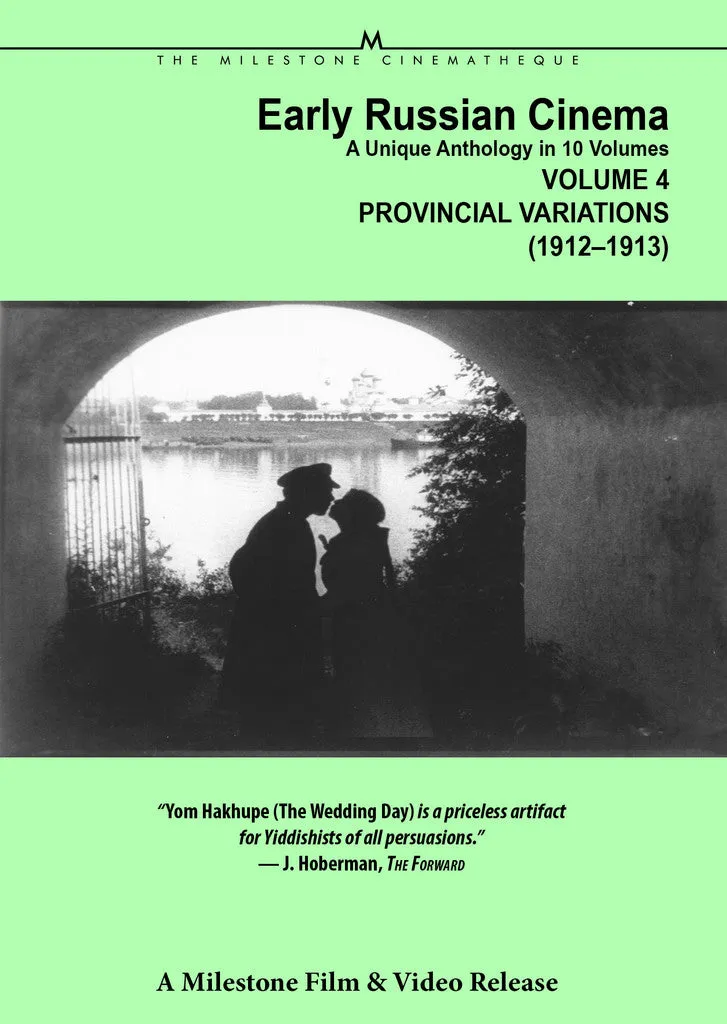Unsurprisingly, the early Russian cinema industry was predominantly urban and concentrated mainly in Moscow. But as the audience grew rapidly, smaller provincial entrepreneurs sought to establish themselves in what had become a highly profitable business. The two films in this program are examples of how this also introduced novelty into the mainstream of production.
Slavinskii’s own account (from a 1940 interview) of how he came to make The Wedding Day is revealing. He recalled being asked by “Mr. Mintus owner of a film distribution company in Warsaw’’ to make some art films. The concept of the film d’art had recently been popularized by Pathé’s successful development of the original French examples. But as Slavinskii explained “to tell the truth, it was not really a matter of making real films d’art but rather shooting material of a documentary type.”
He continued: “In a small town in Silesia I met a travelling company of Jews whose performances were immensely successful in many Polish cities and we made some films together. We had no proper director and our productions were the result of collective effort.’’ Nonetheless, they were apparently successful, which we may assume was due to the exotic novelty and obvious authenticity of such material as The Wedding Day.
Merchant Bashkirov’s Daughter offers a remarkable insight into the sociology of the early Russian cinema industry. For Libken based his first production closely on an actual murder scandal — apparently with the intention of blackmailing the Bashkirov family! Whether they paid up or threatened legal action, the result was a solemn announcement in the trade press that the film would be released under the less specific title, Drama on the Volga, “because the heroine’s surname is identical to that of some well-known merchants in a certain town on the Volga — by sheer coincidence of course.” Thanks to the surrounding publicity, Libken also managed to sell his independent production to Pathé.
The film itself, despite such murky origins (and two missing reels), impresses as one of the most unexpected of all early Russian titles preserved. Nothing in our experience of Western popular movie morality prepares us for the lover’s accidental death and the horrific sequence of events that follows. Is such a non-moralizing perspective, especially associated with heroines, a distinctive feature of Russian cinema — or is it in some way a result of this film’s determined search for sensationalism? There may not be enough evidence to decide, but this fragment poses a tantalizing challenge.
THE WEDDING DAY (Den’venchaniia or Yom Hakhupe).Director/Photography: Evgenii Slavinskii. Based on a play by Iakov Gordin. Producer: S. Mintus (Riga). 1912. Release unknown. Cast: Artists from a troupe of Jewish travelling players.
MERCHANT BASHKIROV’S DAUGHTER (Doch’ kuptsa Bashkirova). Alternative title: Drama on the Volga (Drama na Volge). Director/Screenplay: Nikoloi Larin. Photography: I. Dored. Producer: Grigorii Libken. Production Company: Volga Co. (Iarolslavl’). Released November 19, 1913. Cast: unknown.
This DVD is also available for Institutional Purchase, which includes public performance rights and a 3-year streaming license. Please click on the “Format” button and select “DVD Institutional Rate.”

 Cart(
Cart(










